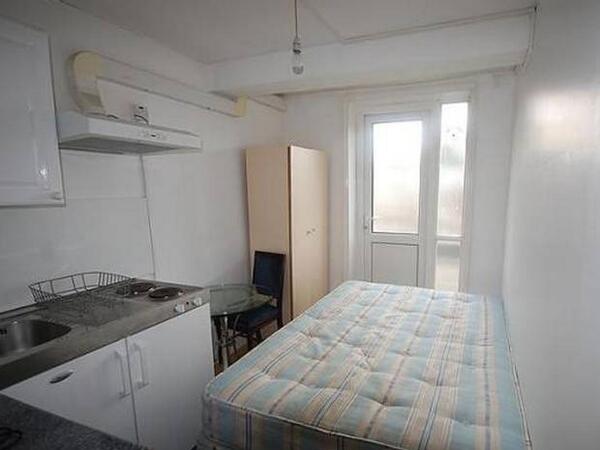So apparently someone wants to rent this tiny London apartment (pictured above) for $1,230/month. Outrage ensues.
Now, the weird thing is that it’s perfectly reasonable to imagine someone wanting to rent that apartment for that price.[ref]I’m not sure about the exact price, of course, but I hear London is pretty expensive. And isn’t microhousing a thing these days? So where’s the outrage coming from?[/ref] I once had to commute up to the Northern Virginia area while my family lived in Williamsburg for work every week. I was lucky enough to have a kind friend with a guess suite, but if I hadn’t had recourse to that, such a tiny little domicile would have been perfect. I seriously investigated living out of my car before my benefactor appeared.
Think about it this way: if someone offers to pay that money for that apartment it is because they have evaluated their alternatives and found that to be the best course of action for them. In what world does eliminating the best course of action someone has available help that person? When someone makes a reasoned consideration that a course of action is the best course of action available, then some do-gooder stepping in to prevent them from taking that course of action is by definition harmful.[ref]Unless you think that the person is incompetent to make their own decision. Which, baring mental illness or a child, just adds “patronizing” next to “harmful”.[/ref]
I think the intuition is that if someone is willing to pay $1,230 for such a tiny apartment, then they must have pretty crappy alternatives. And that is true. But taking away the apartment doesn’t actually improve that person’s prospects. It just removes the evidence of their misfortune from public view. This isn’t about helping anyone any more than placing spikes where homeless people sleep is about helping homeless people. And yes: that’s a real thing. In London they don’t want you to rent out a tiny, cheap apartment but they also don’t want you to sleep on the pavement, either. This looks less like compassion for the poor and a lot more like spraying your house for ants. You don’t really care if the spray kills them or helps them or hurts them, as long as they aren’t in your house anymore.
I call this “Sweatshop Anxiety” because that’s sort of the biggest example of the problem. The thought of poor people in third world countries working long hours in terrible conditions makes rich Westerners want to shut down sweatshops. Which helps the poor… how?
I’m not saying there’s nothing we can do. I’m just saying that reducing options probably almost never helps.

I mostly agree, but can’t help pointing out that “”reducing options probably almost never helps” is a potentially misleading too simple one-liner. There is legitimate purpose for zoning laws and labor regulation (to respond to your two examples). They both reduce options for individuals, and there will be endless debate about how much and where and best implementation, but some amount is better than none for the benefit of all. A one-liner (and also simplistic) response is that the problem of the commons won’t go away by wishing it away. Or, that pure individual utility maximization is suboptimal for society (unless (perhaps) externalities are all internalized).
[I would also argue that in the main individual utility maximization is disproportionately suboptimal for the poor, but that’s a longer more complicated discussion that takes on inequalities of opportunity and choice.]
“This looks less like compassion for the poor and a lot more like spraying your house for ants.”
Thank you for the penetrating logic and for the quote of the day.